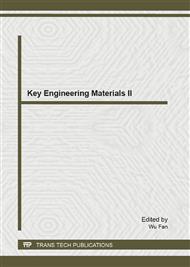p.1609
p.1614
p.1619
p.1624
p.1631
p.1636
p.1641
p.1646
p.1651
Machinery Fault Detection Using the Wavelet Order Spectrum
Abstract:
The non-stationary signal features are averaged in correspondence with the length of analysis time, thus making it impossible to highlight the signal characteristics and caused the difficulties in identifying or diagnosing faults. In this paper, the wavelet order spectrum method using a combination of wavelet transform (WT) and speed frequency ordering. The feature order does not change with variations in speed, thus can effectively identify non-stationary faults in mechanical equipment. In addition, principal components analysis (PCA) is used to extract the main features of the wavelet order spectrum and reduce the volume of data. This is combined with self-organizing maps (SOM) to devise an artificial intelligence method for fault diagnosis in non-stationary states.
Info:
Periodical:
Pages:
1631-1635
Citation:
Online since:
March 2012
Price:
Сopyright:
© 2012 Trans Tech Publications Ltd. All Rights Reserved
Share:
Citation:


